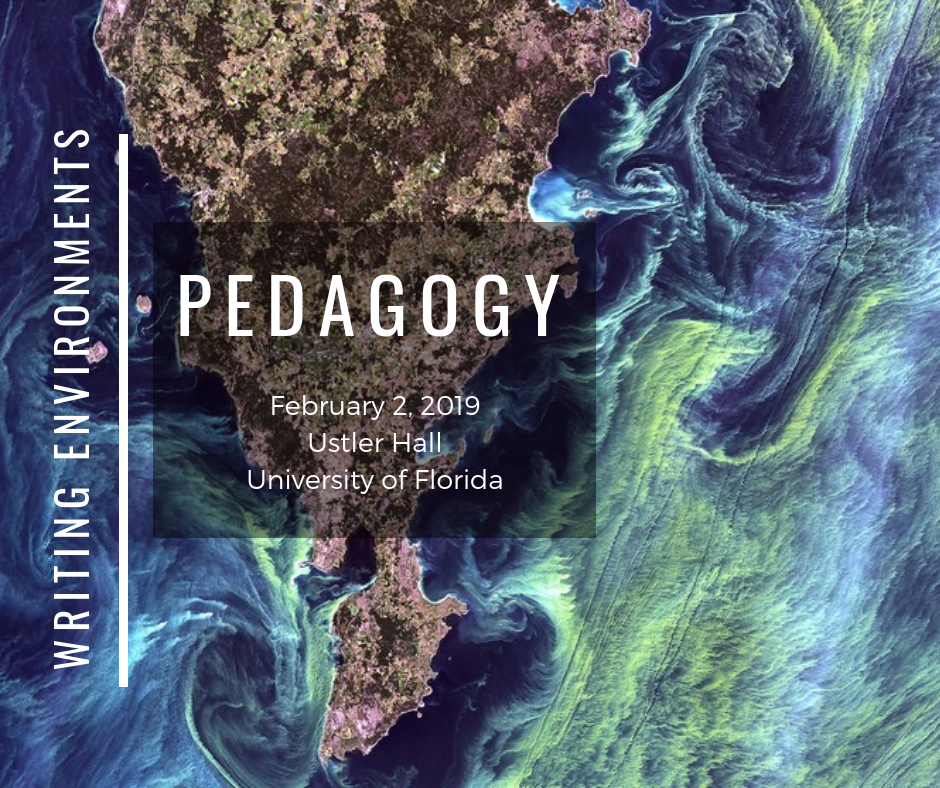
Conference Call for Papers
Click here for the Feb. 2nd, 2019 conference schedule.
The University of Florida’s Writing Program invites proposals for the annual Conference on Pedagogy, Practice and Philosophy. This year, we will examine how writing environments influence writing practice and pedagogy. Writing always takes place somewhere, from notes on a page and assignments addressing a specific audience to graffiti sprayed on a wall and memes designed for viral circulation. As communication becomes more mobile and multimodal, writing instruction must consider where writing takes place alongside how writing moves and circulates. Students and instructors alike communicate across a multitude of writing ecologies, developing composition practices that shape our relationships with individuals, networks, institutions, and events. How can college composition use ideas of space, place, and participation to help students understand different perspectives, formats, and rhetorical goals? We want to discuss tools and approaches for teaching writing as a part of a complex environment that extends beyond courses and classrooms – to analyze how writing environments shape not only where we compose, but how, why, and to what effect.
Analyzing writing environments means examining the conditions as well as the locations of composition. Increasingly, writing programs are asked to incorporate skills that encourage students to participate in public forums or civic action. Writers balance academic goals with community activism, public engagement and professional development. How can college composition prepare students for diverse writing environments and methods of circulation? How do writing instructors already engage community-based pedagogies or emerging writing environments with new media technologies and shifts in pedagogical practice, design, and implementation? In addition, how can writing programs create access to resources or better account for disparate conditions when teaching writing? We seek presentations that address the ever-changing dynamics of composition, while also attending to the challenges and opportunities these changes afford for both students and instructors.
The conference is designed as a practicum that emphasizes collaboration and exchange. Participants are asked to reflect upon the study, practice, and philosophy of teaching writing in universities, and to reconsider current educational trends about learning, engagement, comprehension, and skills-development. In addition, we ask scholars to reflect on writing methods and environments that occur outside of classrooms and to discuss how diverse modes of writing influence classroom learning. The overarching goal of this conference is to create a network for sharing effective, innovative, and creative approaches to composition pedagogy in practice. If you have a theory, lesson, activity, or discussion – please come and share your writing practice and pedagogy with us.
Conference Format
Instead of having panelists read traditional twenty-minute conference papers, we welcome proposals for ten to twelve minute presentations or demonstrations that illustrate pragmatic approaches, strategies, and techniques for teaching writing. Accepted participants will be grouped into themed or conceptual panels, but our goal is to extend the dialog and conversation across the conference sessions. We are also open to proposals for roundtable discussions, which are to model a conversational, collaborative, and audience-centered or participatory format.
Instead of having panelists read traditional conference papers, we welcome proposals for ten to twelve minute presentations or demonstrations that illustrate pragmatic approaches, strategies, and techniques for teaching writing. Accepted participants will be grouped into themed or conceptual panels, but our goal is to extend the dialog and conversation across the conference sessions. We are also open to proposals for roundtable discussions, which model a conversational, collaborative, and audience-centered or participatory format.
Presentation topics can include (but are not limited to):
- Writing space and environments
- Writing situations, networks, assemblages
- Writing for civic action
- Public writing and circulation
- Community literacies
- The use of new media in the writing classroom
- Online writing environments
- Technical communication pedagogy
- Collaborative learning and peer teaching and assessment
- Issues of access or inequality
- Writing technologies
- Making as writing
- Sustainable, ecological, or green approaches to teaching writing
- Exploring race, class, gender, and/or sexuality in the writing classroom
- Current-traditional rhetoric, expressivism, and epistemic pedagogy models
- Prewriting techniques and strategies
- Writing and rhetorical ecologies
- Writing in and across the disciplines
Keynote Workshop
This year, instead of featuring one keynote speaker, we have organized a workshop to discuss diverse writing environments. The workshop will address specific techniques and approaches through structured, collaborative discussions. By creating a space for instructors to communicate and learn from each other, we hope to build upon the expertise already at the conference and allow multiple perspectives to guide a productive exchange.
Submissions
To submit a proposal for an individual presentation, please email a 250 word abstract in .doc, .docx, .rtf, or .pdf format to Shannon Butts at Shannon.butts@ufl.edu. Be sure to include your contact information, affiliation, and position/title on the abstract. To propose a roundtable, please email a description of the discussion, a rationale of what it seeks to accomplish, and the names, affiliations, and positions/titles of each participant. Proposals must be submitted no later than November 25th. Accepted participants will be notified by December 1st. The Conference will occur on February 2, 2019 at the University of Florida.
Please feel free to email Shannon.butts@ufl.edu if you have any questions.